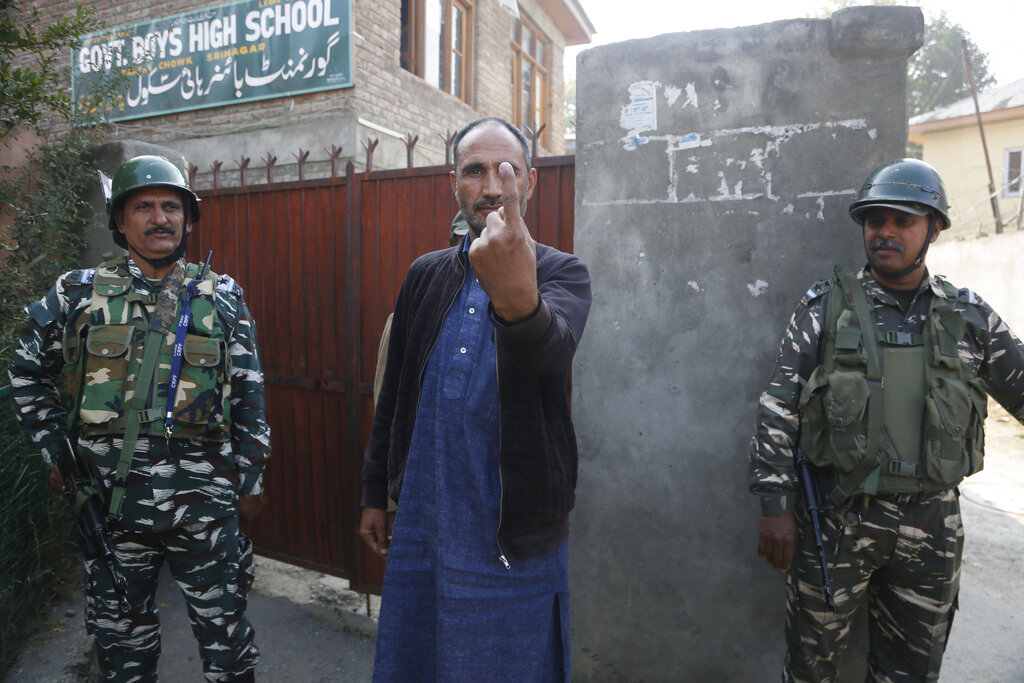Chief election commissioner Sunil Arora clarified on Friday that it was up to the Centre to start the delimitation process for the new Union Territory of Jammu and Kashmir, and that the poll panel had only offered its legal expertise in the matter.
No Assembly election can be held in Jammu and Kashmir without a delimitation since the Jammu and Kashmir Reorganisation Act of August, which created the new Union Territory, also increased the number of its Assembly constituencies.
The act, which came into force on October 31, divides the erstwhile Jammu and Kashmir state into the Union Territory of Jammu and Kashmir and that of Ladakh, while allowing an Assembly only to Jammu and Kashmir.
Section 60 of the act increases the number of Assembly seats in Jammu and Kashmir from 107 to 114 and directs the Election Commission to reserve some seats for the Scheduled Castes and the Scheduled Tribes.
(The number 107 does not include the four seats that fell in Ladakh till now. Twenty-four of the seats will continue to be allotted to “Pakistan-occupied territory” and kept vacant.)
To delimit the constituencies, the commission will have to “associate” itself with four associate members — either four MLAs or four MPs from Jammu and Kashmir — as specified by the Centre.
Sub-section 60(5)(c) says that after the commission notifies the order or orders for delimitation, they “shall have the full force of law and shall not be called in question in any court”.
However, Section 63 appears to suggest that a delimitation exercise cannot be held anytime soon.
It says: “Notwithstanding anything contained in Sections 59 to 61, until the relevant figures for the first census taken after the year 2026 have been published, it shall not be necessary to readjust the division of successor Union Territory of Jammu and Kashmir into Assembly and parliamentary constituencies….”
Before passage, the act had been discussed in each House of Parliament for a day after the home minister had announced it. It was not subject to the scrutiny of select committees or standing committees.
After it was passed, the Election Commission had brainstormed over its clauses relating to the redrawing of the new Union Territory’s Assembly constituencies. But it took no decision since, as a source said, “different sections of the act said different things”.
On Friday, Arora clarified at a news conference: “Under the Jammu and Kashmir Reorganisation Act of 2019, the delimitation commission is to be constituted under this section (62) only, by them (the Centre)…. Whether the notifications (are) issued by MHA (ministry of home affairs) or the ministry of law --- that they will decide between themselves.
“But they initially requested help…. The secretary, law and justice, had (held) one or two meetings. They wanted some legal help from us; we sent our officers. And the moment we hear further from them, depending on who heads the (delimitation) commission, an appropriate representative of appropriate seniority shall be given by (the) ECI.”
He added: “Meanwhile, the moment this act had passed in Parliament, we hired the services of two very senior officers --- retired ---- Shri Shangara Ram, who handled delimitation process in ECI for most of his service life, and Shri R.K. Srivastava, who also has ample experience of delimitation of Uttarakhand in the ECI…. The moment they (the Centre) are ready, (the) ECI is ready.”
A source said the law ministry had written to the poll panel on August 29 that a delimitation commission had been “proposed to be constituted” under the Reorganisation Act. In letters sent on September 2 and 17, the commission had explained “the legal position of the delimitation commission”. The poll panel is yet to receive any further communication.
A nationwide embargo on delimitation till 2026 is also mandated by the Constitution.
In 2002, the 84th constitutional amendment to Articles 82 and 170 had extended the freeze on fresh delimitation until 2026 to motivate states “to pursue the agenda for population stabilisation”.
The 84th amendment also mandated the “readjustment and rationalisation” of parliamentary and Assembly constituencies according to the 1991 census, without affecting the total number of seats allocated to each state or Union Territory.
In 2003, the 87th amendment mandated the readjustment of constituency boundaries according to the 2001 census.
Jammu and Kashmir — which had its own constitution under Article 370 before the government scrapped the state’s special status — amended its Article 47(3) in 2002 to synchronise it with the 84th amendment. No subsequent synchronisation with the 87th amendment was done.
This means the state’s existing constituency boundaries, decided by a delimitation commission in 1995, don’t reflect the 2001 census data.
After reports appeared in June that the Centre was thinking of delimitation in Jammu and Kashmir, National Conference vice-president Omar Abdullah had said: “It appears that any de novo delimitation of Assembly constituencies in J&K now in 2019 would be a deviation from the delimitation freeze applicable all over the country under the Constitution of India.”










